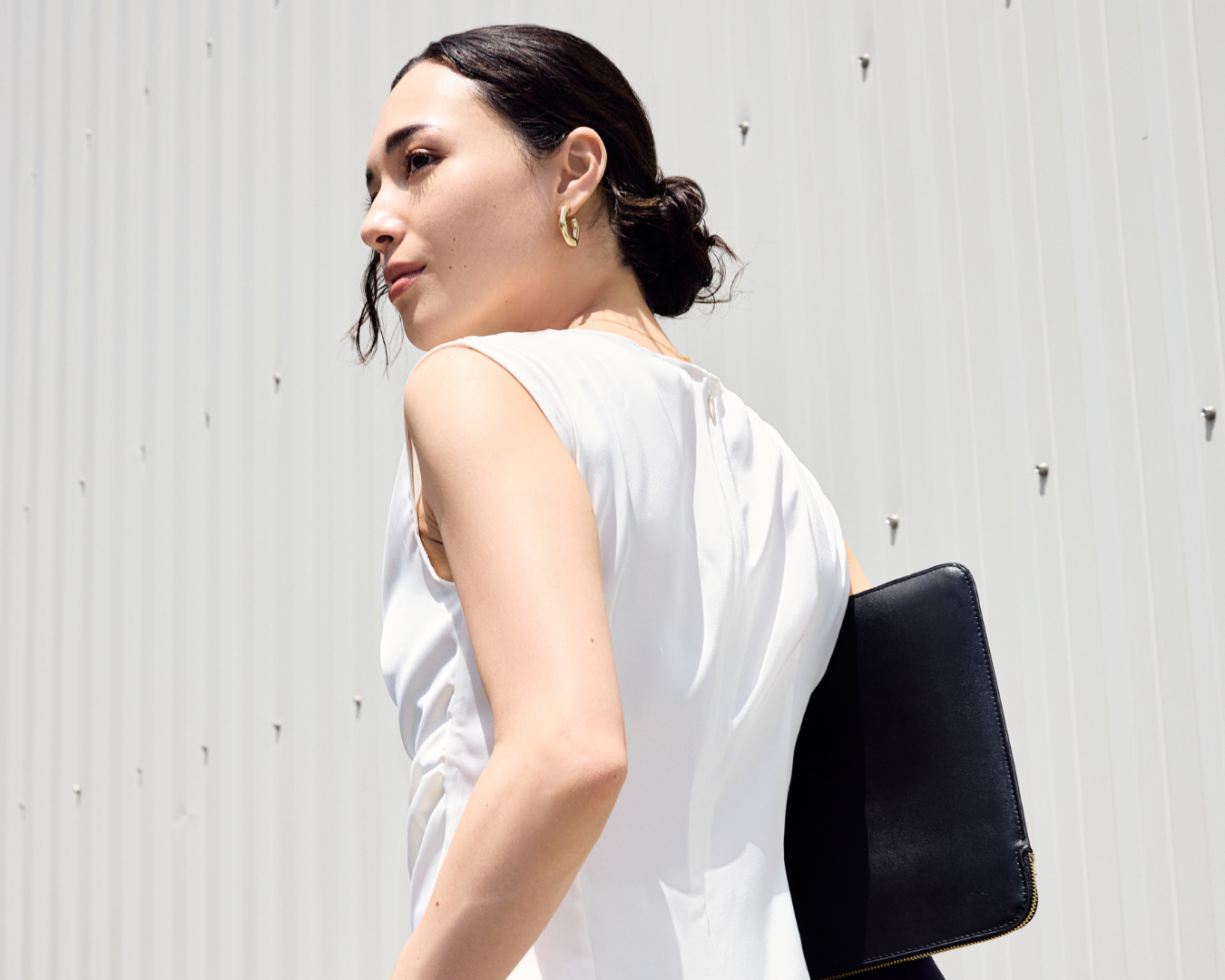What is it that connects our mind and body and brings us peace of mind? Delicious food, a healthy lifestyle, spending time with loved ones ... Everyone has their own way of achieving balance. We will share how various women think about "dealing with their mind and body" through their lives and careers.
The fourth episode tells the story of Noriko Komoriya, the founder of Angelite and a designer who has been active at the forefront of the fashion industry for many years.

- Angelite was launched in 2008. At the time, there were still very few menstrual products available, so what was the inspiration behind coming up with the innovative idea of waterproof, breathable sanitary spats?
The impetus for developing this product came from an incident that occurred on the train on my way home from work, when I was very tired. The woman sitting in front of me got off, so I immediately sat in her seat. When I got home, my daughter said, "Mom, there's something red on your pants." I looked and saw a clear red stain on my beige chinos. I wasn't on my period at the time, so I immediately realized, "Maybe the person sitting in front of me was on her period." Maybe she didn't even notice, or maybe she did and couldn't do anything about it. Either way, it made me feel very sad. I myself had uterine fibroids at the time and had heavy menstrual bleeding, so it didn't really seem like something that could happen to someone else.
I think that experience was a turning point in my awareness. I truly believed that I couldn't be the only one with these concerns. Menstrual concerns vary from person to person, depending on one's constitution and environment. For people like me who have heavy periods or whose jobs require a lot of travel, it's a serious issue. That's why I had a strong desire to create something that I would want to use myself, which led to the development of Angelite .

- Your awareness of menstruation issues was born from that original experience, but how did you actually end up turning it into a product?
I was working as a designer at a major mail-order company when the idea of "doing something new" came up and I became involved as a director.
At that time, I happened to be talking with female employees in the company and with female clients, and naturally, people started asking me if we could make a menstruation-related product. From our everyday conversations and casual conversations, the inconveniences and anxieties that women experience on a daily basis came to light, and I became convinced that there was a real need for this. Around that time, I too had a strong desire to try something that no one had done before, so I found the idea extremely meaningful in that sense as well.
However, at that time, there was still no atmosphere where people could talk openly about menstruation, and the mere mention of "menstrual products" was considered taboo. Due to this social background, there was initially a lot of confusion and opposition within the company. However, the female employees were very interested, and offered many opinions such as "It would be good if it was like this" and "This kind of material would be good." When I proposed the idea to the president, he agreed, saying, "This should be commercialized. It's worth doing because no one else has done it," and so the " Angelite " project was officially launched.
- Angelite is a patented, unprecedented product. Were there any difficulties in developing it?
The biggest challenge was "how to sell it." We were convinced of the necessity and merit of the product itself, but how to express and convey the theme of menstruation was an extremely delicate issue. Even when creating a TV commercial , we didn't know "what to show and how to convey it." Even within the company, there were many voices saying, "This is good, but will it sell?", so it was a constant process of trial and error.
Developing materials, which are essential for our products, is no easy task. The fabric we first used was thick, which affected the clothing and made it uncomfortable to wear. We continued to make improvements, making it thinner, more comfortable, and gentler on the skin, and partnered with Scherrer, a long-established Swiss fabric manufacturer, and major material manufacturers such as Mitsubishi, to develop the ideal fabric.
The final product has been internationally acclaimed, having been patented not only in Japan but also in Europe, Korea, China, etc. The hurdles to obtaining a patent in Europe are particularly high and not easy, so this alone gave us a huge boost of confidence.

- Ms. Komoriya has had a diverse career beyond just developing angelite . How did you build your career after getting married and having children, in an era when it was not common for women to work full-time?
To be honest, I didn't have a clear career plan. However, I was always thinking about "what I can do now" and acting accordingly. I graduated from vocational school at the age of 22 and started my career as a pattern maker, which was the job I wanted to do, but after a few years I was transferred to a designer position. After that, I had the opportunity to work with Takao Ikeda, a designer living in Tokyo and Paris, to help launch a new brand, and when I got married I went independent and started my own company. I just went with the flow and ended up in a place where I was needed.
- Was it difficult to work and have a family at that time?
It was very difficult. Nowadays, it's common for women to work, but in the 1970s and 1980s , it was considered normal to quit your job when you got married, and common sense to quit your job and become a full-time housewife. I never had much desire to get married, and I wanted to live an independent life, so it didn't fit with the values of the time.
However, contrary to my thoughts, people around me often asked me, "When are you going to get married?" and "Aren't you going to have children?" My parents even called me in and asked me, "What are you going to do if you stay single?" (laughs). At a time when it was rare for a woman to remain single after turning 30 , I chose to get married after I turned 30. And even then, the prerequisite was that I "continue working." In a society where the value system assumed that it was natural to quit your job after marriage, women who could clearly say, "I won't quit," were in the minority.

- Just hearing about it sounds like hard work that makes you dizzy, but how did you manage to balance work with childcare?
I really managed to get by with the help of those around me. I raised my child at my own pace until he was about three years old, but it became difficult once he was able to go to nursery school. I would wake up at 6am , take my child to nursery school, go to work, come home at 7pm , do housework, put my child to bed, and then go back to work. I only got about four or five hours of sleep a day. But my mother's generation raised many more children, so I think I thought, "It's easier if I 'm alone ," and somehow managed to get by (laughs).
When my children were in junior high school, I was appointed as a designer for the international brand "Club Monaco," which meant I had to travel between the US, Canada, and Japan. I managed to get through it with the help of my family and friends. Even though I was busy at work, I didn't have time to say "I'm tired." But I feel like spending time with my children actually gave me a break. Just talking to my children and asking, "What happened today?" was a great way to relax.
- When you feel physically or mentally exhausted at work or in your personal life, how do you recover?
I treasure my bath time. Taking a long, relaxing bath every morning and every night helps me reset my mind and body. Just turning down the lights and creating a dimly lit space with only the light from the changing room coming in is so relaxing.
I line up my favorite aromas and bath salts and change the atmosphere depending on my mood that day. I usually soak for about 40 minutes in the evening and 20 minutes in the morning. While soaking in the bath, I try to organize my plans and thoughts for the day. Thanks to this routine, I can recover my spirit even if I push myself a little.
- What kind of activities would you like to do in the future?
First of all, I want more people to know about the products and experiences I've been involved with. In particular, if a product like Angelite can be of even the slightest help to women who have problems with their periods or physical health, I would like to work to spread the word about it. I've heard from women who play sports, nurses, and those who work in physically demanding positions, such as the Self-Defense Forces, that it's a great help, so I would like to continue to improve and popularize it for these types of people.
Personally, I want to meet more people, listen to more stories, and be inspired! I didn't think that way when I was younger, but I've started to feel that way as I've gotten older. I hope to actively interact with the younger generation, get a sense of the trends of the times, and apply them to my future life.




